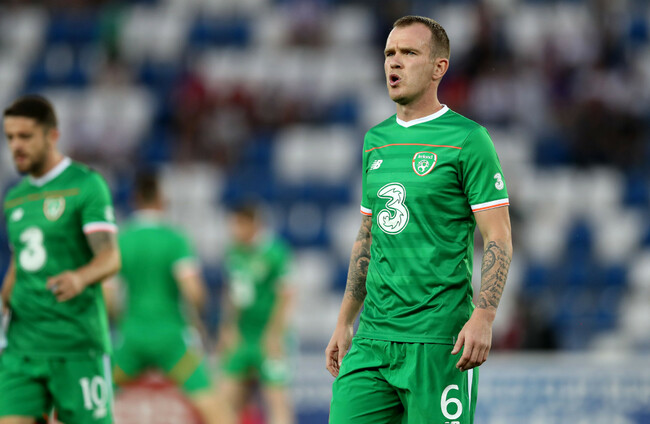IT DOES NOT take a footballing genius to figure out that one big problem for Ireland on Saturday evening and in general over the course of this campaign has been their continuing inability to string a few passes together.
With just 26% of the possession overall and only 62 out of 79 first-half attempted passes completed, the Irish team clearly failed to pay heed to Martin O’Neill’s pre-match warning that his side had to keep the ball amid humid conditions in Tbilisi.
It is far from the first time Ireland have been outplayed by supposedly weaker opposition, and in general during this qualification campaign, they have struggled to retain possession — most notably in their opening fixture against Serbia, when they completed just 94 out of 138 attempted passes in total.
When a team fails to hold onto the ball, the biggest problem is usually midfield. And Ireland have consistently tended to struggle in this area in recent years, regardless of whether it is Glenn Whelan, Jeff Hendrick, Robbie Brady, James McCarthy or Keith Andrews deployed there.
The difference between top-class midfielders and the rest is that the former are constantly demanding the ball.
Wes Hoolahan has this quality, but he usually gets deployed in the number 10 role, so even when the Norwich star does play, it is no guarantee that Ireland will control the play as he does tend to get isolated at times in an advanced role behind the striker.
So the Boys in Green arguably have not had an out-and-out central midfielder who is comfortable on the ball since current assistant boss Roy Keane was a player.
In an ideal world, all midfielders would be like Keane, constantly looking for the ball and demanding it from the backline, but in reality, so many shirk this responsibility some or all of the time.
Check out the clips below of Keane in a 2002 match with Arsenal and notice how he is always making himself available to take the ball off the defender.
It may not look too spectacular but it is a midfielder’s job to knit the play together in this manner. The above clips are from the opening 10 minutes of the match in question, and there are several other examples from this period alone of Keane dictating the play.
More evidence can be seen from the entire match, which is available to watch below. Keep in mind as well, this was against one of the best sides in Europe at the time — an Arsenal team not far off their ‘Invincibles’ era peak.
Watch any of the top midfielders of recent years — Xavi, Luka Modric, Andrea Pirlo or Xabi Alonso — and you will find clips of them doing likewise and controlling the play in this fashion.
Now fast-forward to Saturday night in Tbilisi when a hapless Keane could only watch on in frustration from the sideline knowing that the current Irish has no one near his level.
In comparison to the aforementioned Arsenal game, in the Georgia match you would struggle to find one clip of either Glenn Whelan or Harry Arter showing for the ball, receiving it and moving the play forward.
By contrast, Georgia were engaging in this fundamental skill on a regular basis. Check out the clip below and notice how comfortably they pass the ball and how there is always someone looking to receive it.
By contrast, there was no one from midfield looking to receive the ball whenever Ireland’s defenders had possession, and so the player who had it was forced to go long, invariably surrendering the play in the process.
Not once for a kick-out in the first half did Darren Randolph go short. Instead, he chose to boot it upfield, despite this tactic continually failing and ultimately amplifying the pressure on the Irish goal until the Georgians eventually succeeded in equalising.
The pressure on the Irish side intensified as the game wore on — the visitors’ players were shattered from chasing the ball around all the time, and so on the rare occasions when they did receive it, they were too tired to do anything especially constructive.
There was a debate on the RTÉ panel about whether Irish players were simply not good enough, or just following orders to hoof the ball forward.
They can surely at least play better. When Ireland beat Georgia 2-1 in Tbilisi in 2014, they had 55% of the possession overall. When they hosted the Georgians in Dublin a year later, they again edged the possession (51%).
Yet in the reverse World Cup qualifier in Dublin last year, the Georgians had more of the ball overall for the first time (57%), and of course, this gap widened considerably again on Saturday night.
So after such a big shift despite the two teams having relatively similar personnel during the four games in four years that they have played, it begs the question: have Georgia gotten much better or are Ireland considerably worse than before?
Certainly, the Boys in Green’s ageing side are finding difficult away trips increasingly taxing, while younger Georgian players such as Spartak Moscow star Jano Ananidze are beginning to mature. But perhaps more significant is the number of times the sides have met — Georgia will know Ireland’s weaknesses inside out now, and they have paid the Boys in Green less respect with each encounter.
Whereas once, there was marked caution in their approach, on Saturday, there was a daring and adventurousness to Vladimir Weiss’ side’s play that Ireland did not come close to matching.
However, with two central midfielders in the Irish team — hard-working and committed as they are — that are usually at their best without the ball, in hindsight it is not much of a surprise that O’Neill’s men struggled to get any attacking momentum going.
Before the substitution of Whelan and Arter and the introduction of the more technically sound Aiden McGeady, Ireland looked incapable of scoring from anything other than a set-piece delivery amid one of the team’s most disappointing displays in recent memory.
Subscribe to The42 podcasts here:




















Give that man a pint.
Love it!
Brilliant
Brilliant. Bet that softened his cough!!